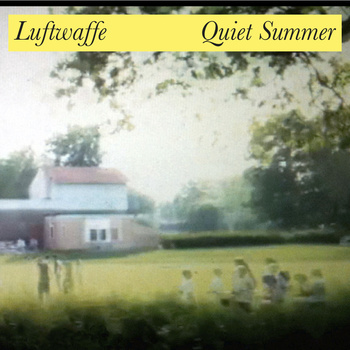Student Arts Fund Sponsors First Vinyl Record

Luftwaffe's album cover
Details
In this age of instantly gratifying web purchases and digitized music libraries, who still cares about old-fashioned vinyl records? Bennett Smith '11 for one. And he is just one of the vintage format's growing legion of fans. (In 2010 vinyl sales were up 14 percent, according to Billboard.)
Last spring, Smith petitioned the John B. Hurford '60 Humanities Center's Student Arts Fund for financing for his own vinyl 7” single for his band, Luftwaffe, at that time a duo with Swarthmore's Toby Altman. (The band has since added two other Haverford students to its lineup.)“It's so easy to record and release music on the internet these days,” says Smith.“So we wanted an opportunity to do it in a different way and be pushed to reach the standards of that different format.”
“Bennett, in his proposal, talked a lot about how in 2010 a CD is really a transitory object,” says James Weissinger, associate director of the Humanities Center, and one of the people involved in the decision-making for the Student Arts Fund.“You take a CD, you put it in your computer, you rip the music, you put it on your mp3 player. A lot of people then throw the CDs away… But vinyl has this magical feeling of sound totally embedded within an object that this little needle brings to life. [And Bennett] is still in love with the physicality of that.”
On the basis of his proposal and some musical samples, Smith was granted $1310 from the Fund to press a record and print sleeves for it. Luftwaffe then set about recording songs specifically for the vinyl release. With Smith on guitar and Altman on drums—and computers programmed to play recorded samples to fill out the duo's sound—they spent the summer of 2010 recording, splitting their time between the basement studio of the Haverford College Dining Center and the bedrooms of the West Philadelphia apartment they shared. The resulting three songs, A-side“Never Let Me Go” and B-sides“Old Friends” and“Warm Blood,” are full of warm washes of shimmery, reverberating guitars and subtle, looping psychedelia. It seems appropriate, then, that they decided to call their subsequent 7” Quiet Summer.
Though the end product is vintage in every way, the production itself was decidedly digital. To keep costs down and to take the place of additional members, Luftwaffe relied on computers to create the recording, a decision that influenced the music itself and resulted in a sound that the band has since outgrown. "We ended up with a cramped and loud and jerky 'file' that we made while we were pretty delirious in July or August," says Smith. "We weren't really going outside too much last summer, often it felt too hot, and the record and the cover image [are] sort of about that—being on our computers in the heat, sort of imagining the summer and the record." Smith says that the music they now play is "very different from what wound up on the record, formally and sonically" in that they've set aside the computers in favor of what Smith characterizes as "loud, melodic guitar pop." And whether or not their foray into the 7" roots of popular music played a role in this evolution, the permanence of vinyl captures a heavily digitized moment in Luftwaffe's history like a mosquito preserved in amber, just as Smith surmised in his initial proposal.
The record was pressed in Nashville, Tennessee, and copies, complete with a hazy, sunny cover photo by Sam Kaplan '10, arrived on campus at the end of fall semester. They are now available for free in the lounge of Ehaus or by emailing Smith (bsmith [at] haverford.edu).
The record earned some nice notices from online press outlets, but Smith is blasé about the attention.“As soon as something is finished it's best for me to leave it and not linger with it too long, because I'll find all the things I don't like about it,” he says.“But I'd say on the whole we're really happy with it and proud of it, especially because being able to do something like this is an amazing opportunity.”
Weissinger and his colleagues who allocate Student Arts Fund monies—including the Humanities Center Student Advisory Board—are also pleased with the result: the first ever Student Arts Fund-sponsored vinyl release.“We really try to use the money to fund specific projects undertaken by students… that work toward specific goals, specific visions and bring something new to campus,” says Weissinger.“It is a space at Haverford for experimentation.”
--Rebecca Raber



